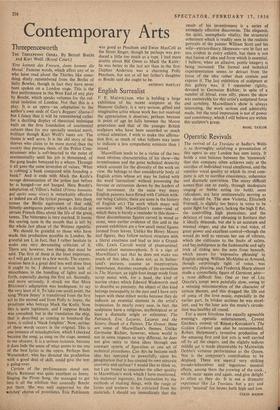Contemporary Arts
'Erst kommt das Fressen, dann kommt die Moral.' Famous words, which affect any of us
who have read about the Thirties like some- thing dimly remembered from the Berlin of Sally Bowles, though in fact they have never
been spoken on a London stage. This is the first performance in the, West End of any play by Brecht, which speaks volumes for the cul- tural isolation of London. Not that this is a play. It is an opera—an adaptation to the author's own ends of Gay's Beggars' Opera— but I fancy that it will be remembered rather for a dazzling display of theatrical technique
built on the firm foundation of continental cabaret than for any specially musical merit, brilliant though Kurt Weill's tunes are. The theme is well worn. It is the old story of the thieves who claim to be more moral than the society that pursues them, of the Police Com- missioner who is soft-hearted to the point of sentimentality until his job is threatened, of the gang leader betrayed by a whore. Through
it all goes the same inversion of values. 'What is robbing a bank compared with founding a
bank?' And it ends with Mack the Knife's savage denunciation of the police just before he is hanged—or not hanged. Here Brecht's
adaptation of Villon's ballad (Freres humains qul apres nous vivez) is remarkably effective as indeed are all the lyrical passages. Into them
comes the Berlin equivalent of that odd, bitterly ambiguous poetry which is distilled in certain French films about the life of the great towns. The bitterness is very marked. It leaves the searing taste in the mouth that is left by the whole last phase of the Weimar republic. We should be grateful to those who have made this production possible in London. So grateful am I, in fact, that I rather hesitate to make any very devastating criticism of it. There are, however, two things that must be said. The first of them is the least important,
so I will get it over in a few words. The expres- sionism here is a great deal less well done than
it ought to be. I detected a certain lack of smoothness in the handling of lights and so forth, especially during the first act. Secondly, and more seriously, it struck me that Marc Blitzstein's adaptation was inadequate, to say the very least of it. To take one small point, the
song 'Pirate Jenny' is transferred from the first act to the second and from Polly to Jenny, the prostitute who betrays Mack the Knife. Now this is quite legitimate, and I suppose Brecht was consulted, but in the translation the ship, that is described as coming to bombard the town, is called a 'black freighter'. Now, neither of these Words occurs in the original. This is one instance of misadaptation, which I checked because the song, as sung on the stage, seemed to me obscure. It is a serious instance, because it does hide the sense of what seems to me one of the best lyrics in the opera. Perhaps Sam Wanamaker, who has directed the production with a good deal of skill, could give the text a going-over.
Certain of the performances stood out. Maria Rcmusat was quite excellent as Jenny. Singing the Pirate Song, she managed to get into it all the nihilism that assuredly Brecht put there. She , was well supported by. the witches' chorus of prostitutes. Eric Pohlmann
was good as Peachum and Ewan MacColl as the Street Singer, though he perhaps was pro- duced a little too much as a type,. I had more doubts about BM Owen as Mack the Knife : he was better in the last act than in the first. Daphne Anderson was a charming Polly Peachum, but not at all her father's daughter as Brecht said she ought to be.
ANTHONY HARTLEY


































 Previous page
Previous page